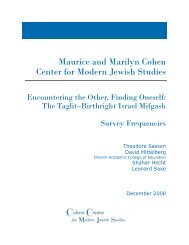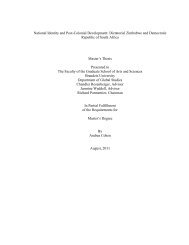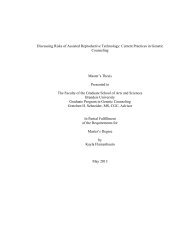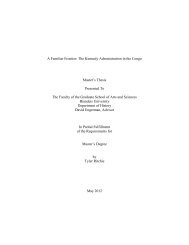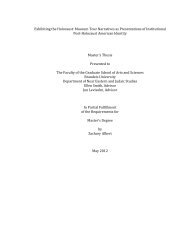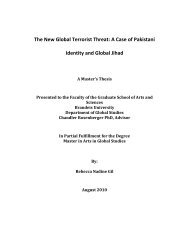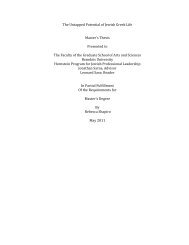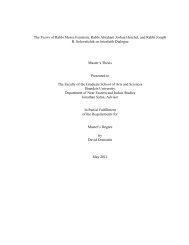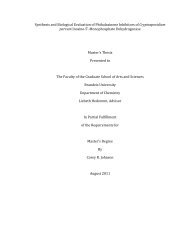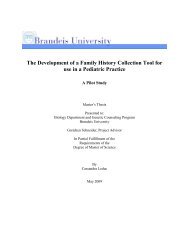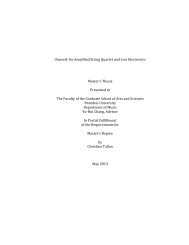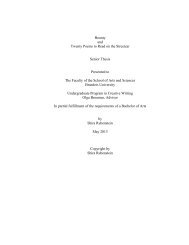U.S. agricultural products on credit. Thus, in his capacity as Secretary <strong>of</strong> Agriculture,<strong>Benson</strong> made a number <strong>of</strong> trips to countries around <strong>the</strong> world, two <strong>of</strong> which carried himto <strong>Israel</strong>.Again, as noted in Chapter Two, my analysis <strong>of</strong> <strong>Benson</strong>'s political experience islimited because <strong>of</strong> <strong>the</strong> lack <strong>of</strong> access to <strong>Benson</strong>'s personal record. Yet <strong>the</strong> public record isquite compelling <strong>and</strong> is <strong>the</strong> basis for my examination here. The documentation in thischapter is more diverse than for <strong>the</strong> previous chapter detailing his religious perspectives,<strong>and</strong> includes some <strong>of</strong> his own thoughts <strong>and</strong> public comments, illustrated mostly innewspapers <strong>and</strong> o<strong>the</strong>r articles, as well as some personal correspondence. In order toachieve a more thorough underst<strong>and</strong>ing <strong>of</strong> <strong>Benson</strong>'s views, I begin with a study <strong>of</strong> <strong>the</strong>political views <strong>of</strong> contemporary U.S. leaders, <strong>and</strong> <strong>the</strong>n contrast <strong>the</strong>m with those <strong>of</strong><strong>Benson</strong>. The record reveals that, while <strong>Benson</strong> faithfully represented his country'sinterests during his visits <strong>and</strong> in his public commentary, he also exhibited a strongpartiality for <strong>the</strong> Jewish <strong>State</strong>, especially regarding its disputed place in <strong>the</strong> Middle East.America's relationship with <strong>Israel</strong> remained ambivalent throughout <strong>the</strong> 1950s, <strong>and</strong>in <strong>the</strong> years leading up to <strong>Israel</strong>'s establishment in 1948, American support <strong>of</strong> a Jewishstate was anything but certain. After World War I, America clung to an internationaldiplomatic policy <strong>of</strong> neutrality, especially where <strong>the</strong> Middle East was concerned.Pr<strong>of</strong>essional diplomats <strong>of</strong> <strong>the</strong> 1920s particularly opposed Zionism, a dislike that MichaelOren attributes to Christian missionary efforts in <strong>the</strong> Middle East <strong>and</strong> <strong>the</strong>ir concern overZionist disruption <strong>of</strong> <strong>the</strong>ir labors. 113President Franklin D. Roosevelt proclaimed anassurance <strong>of</strong> American neutrality, but, like much <strong>of</strong> his country, seemed ambivalent about113Oren, Power, Faith <strong>and</strong> Fantasy, 423.42
Zionist hopes for a Jewish state. He had promised King ibn Saud <strong>of</strong> Saudi Arabia “neverto assist <strong>the</strong> Jews at <strong>the</strong> Arabs' expense,” 114 but later confided to his treasury secretary,Henry Morgenthau Jr., that many Palestinian Arabs had even “less right [in Palestine]than <strong>the</strong> Jews.” 115Roosevelt's successor, Harry S. Truman, on <strong>the</strong> o<strong>the</strong>r h<strong>and</strong>, wasunequivocally supportive <strong>of</strong> <strong>the</strong> creation <strong>of</strong> <strong>the</strong> Jewish <strong>State</strong>, even in opposition to severalmembers <strong>of</strong> his cabinet. Oren describes <strong>the</strong> <strong>State</strong> Department as “hostile” to <strong>the</strong> Zionistenterprise, 116 <strong>and</strong> in Truman's words, “more concerned about <strong>the</strong> Arab reaction than <strong>the</strong>suffering <strong>of</strong> <strong>the</strong> Jews.” Even <strong>the</strong> venerable George Marshall voiced opposition to <strong>the</strong>formation <strong>of</strong> a Jewish <strong>State</strong> in Palestine. 117 Yet notwithst<strong>and</strong>ing <strong>the</strong> opposition, <strong>and</strong>encouraged by Jewish <strong>and</strong> Christian supporters alike (see chapter 2), on May 14, 1948,President Truman <strong>of</strong>ficially recognized <strong>the</strong> government <strong>of</strong> <strong>the</strong> <strong>State</strong> <strong>of</strong> <strong>Israel</strong>. 118Truman's positive view <strong>of</strong> a Jewish homel<strong>and</strong> in Palestine echoed that <strong>of</strong> manyAmericans as <strong>the</strong>y gradually shifted from a Protestant, anti-semitic American view, to amore “ecumenical” Judeo-Christian identity. 119Peter Grose explains that Truman'sdecision was also affected by guilt over <strong>the</strong> Holocaust. 120He was not without concernsregarding <strong>the</strong> international political implications <strong>of</strong> American support <strong>of</strong> <strong>Israel</strong>, nor <strong>of</strong> <strong>the</strong>need for America to retain oil connections in <strong>the</strong> Middle East, but he remained committedto his May 14, 1948 decision. 121114115116117118119120121Oren, Power, Faith <strong>and</strong> Fantasy, 471.Oren, Power, Faith <strong>and</strong> Fantasy, 429.Oren, Power, Faith <strong>and</strong> Fantasy, 440.Oren, Power, Faith <strong>and</strong> Fantasy, 489.White House telegram, 6:11 p.m. Eastern St<strong>and</strong>ard Time, Truman Presidential Library, online:http://www.trumanlibrary.org/photos/israel.jpg.Mart, “Christianization <strong>of</strong> <strong>Israel</strong> <strong>and</strong> Jews,” 112; Oren, Power, Faith <strong>and</strong> Fantasy, 484.Grose, <strong>Israel</strong> in <strong>the</strong> Mind <strong>of</strong> America, 244.Oren, Power, Faith <strong>and</strong> Fantasy, 500; Grose, <strong>Israel</strong> in <strong>the</strong> Mind <strong>of</strong> America, 244.43
- Page 2 and 3: AcknowledgementsI am indebted to Pr
- Page 4 and 5: Table of ContentsIntroduction - 1Ch
- Page 6 and 7: elationship in any depth.In researc
- Page 8 and 9: friendships with various Israeli le
- Page 10 and 11: Joseph Smith taught that Latter-day
- Page 12 and 13: Gentiles, and it will be again inha
- Page 14 and 15: for their long suffering. Yet, he,
- Page 16 and 17: focus on both the fulfillment of pr
- Page 18 and 19: Smith and Brigham Young, as previou
- Page 20 and 21: Smith, the members of the group “
- Page 22 and 23: Jews.'” 46Benjamin further descri
- Page 24 and 25: Chapter 2: Benson's Religious Leade
- Page 26 and 27: audiences. The first, called, “Je
- Page 28 and 29: Benson's sense of kinship for the J
- Page 30 and 31: eturn of the Jews to the land of Pa
- Page 32 and 33: general mention of his efforts at s
- Page 34 and 35: Or perhaps it did not aid in his ap
- Page 36 and 37: about Jews and Israel, throughout t
- Page 38 and 39: and Peter Grose describe the frustr
- Page 40 and 41: Israel's victory in the Six Day War
- Page 42 and 43: the Messiah. Indeed, both Benson an
- Page 44 and 45: those visits, as opposed to those o
- Page 48 and 49: The American public, though divided
- Page 50 and 51: States.” 133Indeed, a Gallup poll
- Page 52 and 53: with Britain and France, for their
- Page 54 and 55: many Americans that Israel was now,
- Page 56 and 57: those experiences to give validity
- Page 58 and 59: Benson, “I want you to pray to Go
- Page 60 and 61: gathering. Some of those themes inc
- Page 62 and 63: Ben Gurion and Levi Eshkol, both of
- Page 64 and 65: sending “two Mormon Books,” and
- Page 66 and 67: Yet Ben Gurion's next letter, dated
- Page 68 and 69: on this occasion with Shimon Peres
- Page 70 and 71: cultivate land for crops in the 194
- Page 72 and 73: attitude in the Synagogue Light art
- Page 74 and 75: United States, his views on Israel
- Page 76 and 77: eminded the host that he had not be
- Page 78 and 79: Thee, O Father, Lord of heaven and
- Page 80 and 81: "Though Thy servant is now far from
- Page 82 and 83: BibliographyAlteras, Isaac. Eisenho
- Page 84 and 85: Madsen, Truman G. “Mormon Attitud




